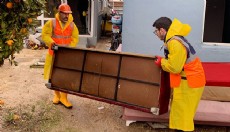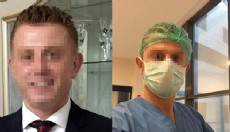




Long waiting times and high costs in the private sector also push patients to look for better alternatives elsewhere.
Another reason is the availability of clinics in certain countries that specialize in skin conditions. These clinics often offer combined treatments, such as medical therapy alongside environmental and lifestyle-based approaches. This kind of integrated care is not available in every health system, which makes some countries more attractive for treatment.
For some patients, traveling abroad also means receiving care in a setting where support services are stronger. These may include better communication with doctors, organized post-treatment monitoring, or even faster access to medications. Treatment abroad is not only about location, but about how the entire care process is designed.
Azerbaijan (BTK Clinic)
Azerbaijan has become a key destination for patients with psoriasis, largely due to the unique treatment model developed by the BTK Clinic in Azerbaijan. Unlike many conventional dermatology centers, BTK Clinic uses an integrative medicine approach, combining evidence-based medical therapies with supportive, non-pharmacological methods aimed at reducing inflammation and improving immune balance.
This integrative strategy begins with a comprehensive patient assessment. Dermatologists evaluate not only skin symptoms but also metabolic status, immune function, gut health, stress levels, and lifestyle factors. The goal is to understand potential root contributors to disease severity and tailor therapy accordingly.
At the core of BTK’s treatment system are:
• Biologic therapies, used when indicated by disease severity and previous treatment history
• Phototherapy protocols, including narrowband UVB, designed to minimize flare frequency
• Medical nutrition plans, often involving anti-inflammatory diets guided by laboratory data
• Stress management interventions, such as guided breathing or mild biofeedback
• Detox protocols, when toxic load is suspected to impact immune regulation
These treatments are not offered as isolated interventions. They are combined strategically, allowing patients to benefit from the synergistic effect of immune-targeted medication and lifestyle correction. This is especially valuable for patients with long-term psoriasis who may have experienced limited results with drug-only approaches.
Patients who undergo treatment at BTK Clinic also receive structured post-care planning. This includes remote monitoring, dietary advice, and flare-up management education. Clinical response is measured not only by visible skin improvement, but also by patient-reported outcome tools like DLQI (Dermatology Life Quality Index).
The integrative medicine model used at BTK Clinic makes it different from typical dermatology centers. It addresses psoriasis not only as a skin condition but as a complex disorder affected by internal systems. This is particularly important for patients with comorbidities such as metabolic syndrome, fatigue, or gastrointestinal issues, which are often overlooked in conventional settings.
Moreover, the clinic's affordability does not compromise treatment quality. BTK imports all critical pharmaceuticals from European suppliers and complies with international dermatology treatment guidelines. At the same time, patients benefit from extended physician contact time and supportive services like medical interpretation and travel coordination.
For individuals seeking a structured yet personalized form of psoriasis care abroad, BTK Clinic offers a clear alternative to medication-only clinics. The integration of immunology, dermatology, and lifestyle science makes it one of the few centers in the region using a multidisciplinary framework with proven results in chronic skin disease.
Germany
Germany is one of the most trusted countries in Europe for dermatology. Hospitals like Charité in Berlin or University Hospital in Munich provide access to updated treatments under strict clinical guidelines. Patients can receive topical therapies, light therapy, or biologic injections, depending on their condition.
Germany also maintains detailed national registries for psoriasis cases. These help doctors track what works best over time. When a patient visits a clinic, treatment is usually designed based on both current symptoms and long-term response data.
Language is rarely a barrier in larger hospitals, as many staff speak English. However, getting an appointment can take time, and patients are usually expected to submit detailed medical records in advance.
Israel
Israel combines advanced medical treatment with a unique natural advantage: the Dead Sea. Many clinics in the country, such as Soroka Medical Center or Ein Gedi Spa Clinic, offer medical therapy alongside environmental exposure, which can support skin healing.
The area around the Dead Sea is known for its sunlight, low altitude, and mineral-rich air. These factors help reduce inflammation for many patients. Some visitors stay for several weeks to benefit from daily sun exposure combined with dermatological care.
Israeli dermatology clinics also provide access to modern medications, including biologic drugs. While costs can vary, many centers offer packages that include medical supervision, lab tests, and transport to treatment locations.
South Korea
South Korea is a technology-driven country with advanced hospital infrastructure. Leading centers like Samsung Medical Center and Seoul National University Hospital treat a wide range of skin disorders, including moderate to severe psoriasis.
Doctors often use combination therapies involving both modern medications and targeted light therapy. South Korea is also active in clinical research, meaning patients may gain access to new medications before they are widely available in other countries.
The process for foreign patients is well-organized. However, smaller clinics may not offer English-speaking support, which can make communication harder. For those seeking structured care and faster access to newer treatments, South Korea is a reliable option.
Czech Republic
The Czech Republic is known for its spa towns that specialize in balneotherapy, a form of treatment using mineral water and natural resources. Towns like Karlovy Vary and Mariánské Lázně have clinics that treat skin conditions with natural therapies.
These treatments are mostly recommended for mild to moderate cases. Patients typically stay for two to four weeks and receive daily therapies along with basic medical supervision. While it is not a replacement for prescription treatments, it can support skin healing during remission periods.
• Common therapies include mineral baths, mud treatments, and UV light sessions
• These clinics often operate as wellness resorts with optional medical support
The setting is calm, and for some patients, being in a stress-free environment helps control flare-ups. However, access to stronger medications like biologics may be limited.
Turkey
Turkey offers a balance of affordability and access to structured dermatological care. Major hospitals in cities like Istanbul, Ankara, and Izmir provide modern psoriasis treatment options. These include biologics, phototherapy, and oral medications depending on patient needs.
Hospitals such as Hacettepe University Medical Center have experienced dermatologists and follow international treatment guidelines. Patients receive diagnosis and treatment within a short time frame, which is useful for those who need urgent care.
For international patients, many hospitals offer English-speaking coordinators. While Turkey does not have a strong balneotherapy tradition, it is a good destination for those seeking a straightforward, medical-based treatment plan at a reasonable cost.
Spain
Spain combines modern dermatology services with a favorable climate. University hospitals in cities like Barcelona and Valencia are experienced in treating autoimmune skin diseases. Patients can receive biologics, topical therapy, or phototherapy depending on the severity of their condition.
Some clinics also offer add-on therapies like sea bathing or sun exposure, especially in Mediterranean areas. These are not official parts of the treatment plan but may support skin improvement. Clinics along the coast sometimes blend both medical and environmental treatments.
Spain also participates in international psoriasis studies, which helps maintain updated treatment protocols. For European patients, travel to Spain is simple, and language support is available in larger medical centers.
How to Choose the Right Country for Treatment
Choosing the right country depends on treatment goals, budget, and personal preferences. Some countries focus more on medical protocols, while others include supportive therapies like climatotherapy or spa treatments.
Key factors to consider:
• Does the country offer access to modern medications like biologics?
• Are there specialists in chronic skin conditions and organized treatment plans?
Patients should also check if language support is available, how long treatment will take, and what follow-up options exist. Some clinics help with accommodation and post-treatment support, while others expect the patient to manage these separately.
Final Thoughts
Psoriasis treatment varies widely across countries. While Germany, Israel, and South Korea offer structured medical care with strong infrastructure, places like the Czech Republic and Azerbaijan add value with their cost-efficiency or supportive therapies. The BTK Clinic in Azerbaijan stands out for its focus on personalized care and accessibility, especially for patients seeking an affordable but modern option.
Every patient's situation is different, and success often depends on matching personal needs with what the clinic or country offers. Being informed, asking detailed questions before travel, and having clear expectations are key steps in finding the right psoriasis treatment abroad.
 |
 |
 |
 |
|||||
|
|
|||||||
 Küfür, hakaret içeren; dil, din, ırk ayrımı yapan; yasalara aykırı ifade ve beyanda bulunan ve tamamı büyük harflerle yazılan yorumlar yayınlanmayacaktır. Neleri kabul ediyorum: IP adresimin kaydedileceğini, adli makamlarca istenmesi durumunda ip adresimin yetkililerle paylaşılacağını, yazılan yorumların sorumluluğunun tarafıma ait olduğunu, yazımın, yetkililerce, fikrim sorulmaksızın yayından kaldırılabileceğini bu siteye girdiğim andan itibaren kabul etmiş sayılırım. |
|
||||||||||||
|
|
||||||||||||
 Koç  21 Mart - 20 Nisan
|
||||||||||||
|
||||||||||||
|
||||||||||||

